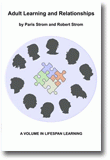
Adult Learning and Relationships
By:
Paris S. Strom, Auburn University
Robert D. Strom, Arizona State University
A volume in the series: Lifespan Learning. Editor(s): Paris S. Strom, Auburn University. Robert D. Strom, Arizona State University.
Published 2011
The communication and technology revolution presents each age group of adults with new expectations for learning. This book describes how education for young adults (20 to 40 years of age), persons of middle age (40 to 60 years of age) and older adults (age 60 +) can be differentiated to fulfill changing role demands emerging in response to social transformation. Developmental tasks for a society of longevity are defined including why youth should be seen as essential sources of learning for adults. Themes for each generation are school, work, family, and personal identity.
The way to ensure consideration of cultural evolution and cultural preservation is for intergenerational communication to become a common obligation. Reliance on age-segregated communication is popular and comfortable because peer conversations have greater agreement and less uncertainty. However, this practice prevents reflection on views regarded as important by other age groups. When greater amounts of time are devoted to intergenerational dialogue, the usual outcomes are reciprocal learning, mutual respect, and harmony. This book identifies and elaborates the conditions of learning needed to motivate an age-integrated society.
This book is for several audiences. Faculty and students studying development will find insights on learning at successive ages. Counselors will learn about client needs across the full age range of adulthood. Social service providers will recognize transition in family relationships. Nurses and administrators will discover ways to help assisted living residents maintain mental abilities and build social networks. General readers will understand ways to improve life for relatives, friends, co-workers, and themselves.
CONTENTS
Preface. PART I: YOUNG ADULTS AGE 20-40. 1. The College Experience.
2. Stress and Resilience at Work. 3. Parent Obligations to Children.
4. Creative Thinking and Teamwork. PART II: MIDDLE AGE 40-60. 5.
Self-Evaluation and Revision of Goals. 6. Reciprocal Learning With Adolescents.
7. Adjustment in Relationships With Parents. 8. Grandparents Raising
Grandchildren. PART III: OLDER ADULTS AGE 60+. 9. Support for Younger
Generations. 10. Longevity and Identity Change. 11. Group Communication
Skills. 12. Mental Abilities in Transition. References
-
Paperback978-1-61735-387-1
Web price: $45.04 (Reg. 52.99)
-
Hardcover978-1-61735-388-8
Web price: $80.74 (Reg. 94.99)
- eBook9781617353895

-
 Adolescents in the Internet Age
A Team Learning and Teaching Perspective Third Edition
Adolescents in the Internet Age
A Team Learning and Teaching Perspective Third Edition
-
 Adolescents In The Internet Age, 2nd Edition
Teaching And Learning From Them
Adolescents In The Internet Age, 2nd Edition
Teaching And Learning From Them
-
 Learning Throughout Life
An Intergenerational Perspective
Learning Throughout Life
An Intergenerational Perspective
-
 Parenting Young Children
Exploring the Internet, Television, Play, and Reading
Parenting Young Children
Exploring the Internet, Television, Play, and Reading
-
 Polling Student Voices for School Improvement
A Guide for Educational Leaders - 2nd Edition
Polling Student Voices for School Improvement
A Guide for Educational Leaders - 2nd Edition
-
 Polling Students for School Improvement and Reform
Polling Students for School Improvement and Reform
-
 Thinking in Childhood and Adolescence
Thinking in Childhood and Adolescence

